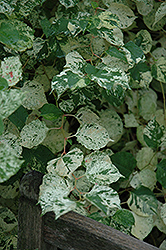Variegated Japanese Fleeceflower
Fallopia japonica 'Variegata'
Height: 12 inches
Spread: 24 inches
Sunlight:
![]()
![]()
Hardiness Zone: 3
Other Names: Polygonum japonicum
Description:
An aggressive and spreading groundcover shrub with creamy variegated leaves held on upright branches; very effective, will outcompete weeds and even other plants, needs to be contained or grown where vigorous spreading is desirable
Ornamental Features
Variegated Japanese Fleeceflower's attractive round leaves remain dark green in color with showy white variegation throughout the season on a plant with an upright spreading habit of growth. The red stems are very colorful and add to the overall interest of the plant.
Landscape Attributes
Variegated Japanese Fleeceflower is a dense herbaceous perennial with an upright spreading habit of growth. Its relatively coarse texture can be used to stand it apart from other garden plants with finer foliage.
This is a high maintenance plant that will require regular care and upkeep, and is best cleaned up in early spring before it resumes active growth for the season. Gardeners should be aware of the following characteristic(s) that may warrant special consideration;
- Invasive
Variegated Japanese Fleeceflower is recommended for the following landscape applications;
- Groundcover
Planting & Growing
Variegated Japanese Fleeceflower will grow to be about 12 inches tall at maturity, with a spread of 24 inches. Its foliage tends to remain dense right to the ground, not requiring facer plants in front. It grows at a fast rate, and under ideal conditions can be expected to live for approximately 10 years. As an herbaceous perennial, this plant will usually die back to the crown each winter, and will regrow from the base each spring. Be careful not to disturb the crown in late winter when it may not be readily seen!
This plant does best in full sun to partial shade. It prefers to grow in average to moist conditions, and shouldn't be allowed to dry out. It is not particular as to soil type or pH. It is highly tolerant of urban pollution and will even thrive in inner city environments. This is a selected variety of a species not originally from North America. It can be propagated by division; however, as a cultivated variety, be aware that it may be subject to certain restrictions or prohibitions on propagation.
